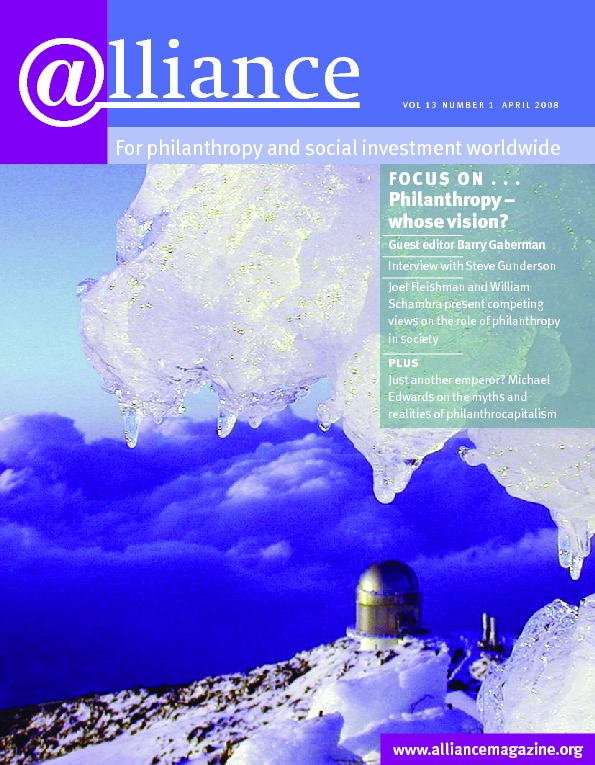From the perspective of Europe the picture is very clear. The same appears to be true in much of the so-called developing world. Promising signs are to be seen in China, and Russia, too, seems to be making progress, if a bit haltingly. India is a veritable success story. The United States? The situation is traditionally flourishing, even if there is an undercurrent of radical criticism related to the government’s tax treatment of foundations. I am talking about the overall social legitimacy and cultural acceptance of philanthropy: the ‘philanthropic peace’.
Indeed, few philanthropists or foundations in recent years have felt challenged about the essence of their enterprise: questions have arisen about how to do things differently, or better – but this is technical and does not affect the position in society of foundations or private giving. Threats to the fiscal treatment of foundations are still common and should not be underrated, especially in those countries where the philanthropic sector has gradually acquired a recognition of its common good role: fiscal benefits can be easily lost, in times of generalized tax deficits. This is important, but it is not the heart of the matter.
The first decade of the 21st century sees philanthropy well esteemed, appreciated, looked to for inspiration and even guidance, not merely money. This is interesting, especially given that it would be almost impossible to define a common philanthropic ideology. Though by definition devoted to the common interest, foundations’ political positions range from compassionate conservatism to innovative radicalism – with very much in between. None the less, or perhaps because of this, several public opinion polls in Europe reveal that people of all types and backgrounds trust philanthropy and the non-profit sector more than they trust political institutions.
Yet this is no time for idle rejoicing. Two types of new challenge are revealing themselves: one is systemic, the other intrinsic to the sector itself. Philanthropy should wonder why it is so successful. On the one hand – and this is bad news – it could be simply relative: when just about everything else in the societal landscape is weakening, especially those aspects deemed ‘political’, it is not difficult to win people’s appreciation (beware: the writer is Italian!). At the same time, though, we should fully acknowledge that philanthropy and charities are regarded by the public as real ‘trust producers’ and, as such, they are seen as important bulwarks of the social bond. Civil society groups – and sometimes, even local governments – get more than money from working with foundations. A social value chain, comprising mutual learning, synergistic efforts and resource pooling, is the real value added by philanthropy.
We should not fool ourselves into thinking that this role does not bring a political element with it. It is to be accepted and interpreted serenely, with no messianic blunderings on the one hand or bashfulness on the other. In our fragmented democracies, certainly this requires new alertness.
Moreover, the philanthropic trade needs some degree of updating. Let me mention a few areas. The growth of philanthropy in terms of donations and the birth of new foundations is impressive everywhere. This mirrors the huge process of wealth transfer that is taking place as well as the change in attitudes towards philanthropy in many social strata. There is a new generation of philanthropists to be welcomed, listened to and, to some extent, educated. This is a task the sector should prepare to do properly, balancing tradition and openness. The consolidation of philanthropic practice and the sheer amount of resources available implies more professionalism in the sector – but we know all too well how this can almost unnoticeably lead to bureaucratization.
A high degree of idiosyncrasy and improvisation has always been the sector’s character and perhaps one of its very strengths, yet if the search for new solutions to ever more complex problems is a primary goal for philanthropy, the recent trend towards research-driven programmes is to be not only supported but expanded. Both in designing and in evaluating programmes, applied social science and even theory can sometimes make the difference. Feasibility and sustainability of solutions are far more important than glamour. Sharing results, successes and failures, within the sector is crucial: we must still invest in common platforms and networks. Peace, in philanthropy, does not need to equal immobility.
Marco Demarie is Chairman, Centro di Documentazione sulle Fondazioni, Turin, Italy. Email marco.demarie@gmail.com





Comments (0)